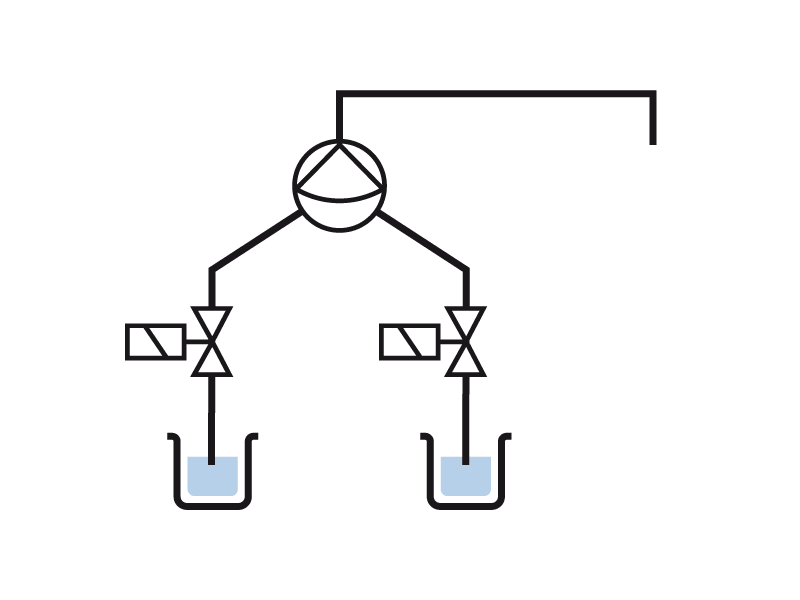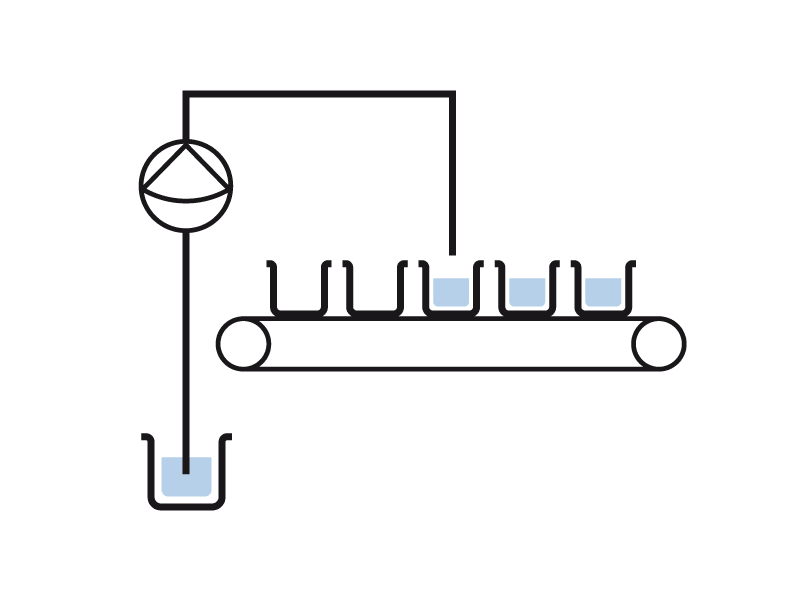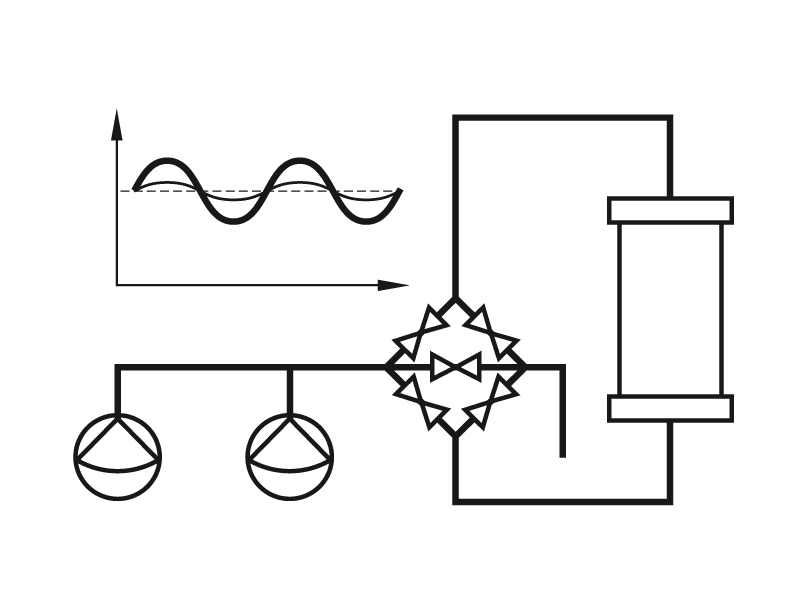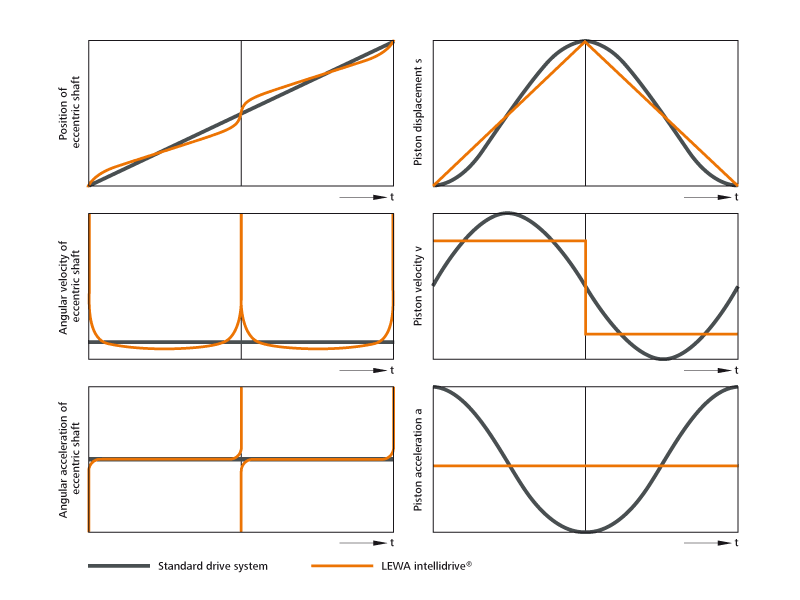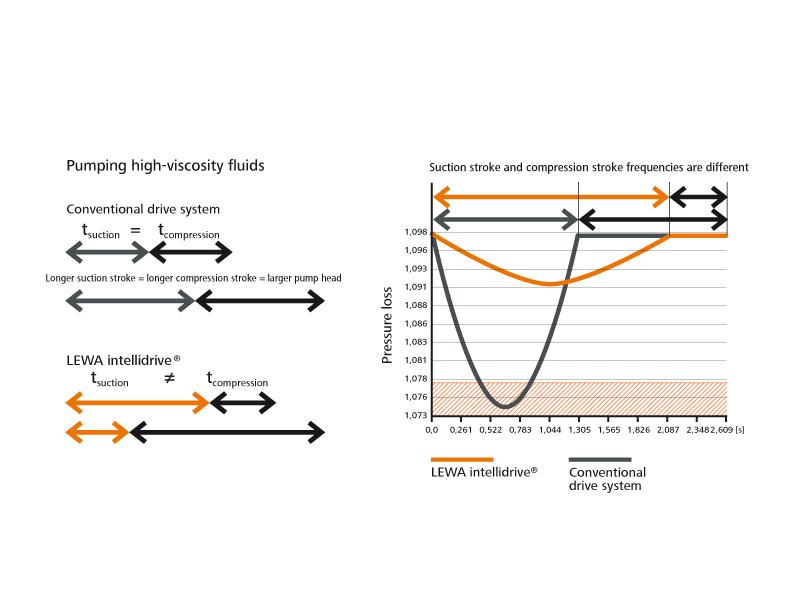LEWA intellidrive - LEWA combines what was separate before
Pumps with frequency controlled standard drives and a separate servo drive for stroke length setting can now be combined into a single unit. A partial stroke mode takes over the function of the stroke length setting for setting the volume flow. The pump piston does not move completely to front dead center in the discharge stroke phase – depending on the desired flow rate, the piston stops beforehand and moves back into the suction stroke.
The innovation: the angular speed can be changed during a rotation (that is, also within the discharge and/or suction phase). As a result, we are able to achieve a variable change of the stroke speed so that the fluid kinematics can be matched exactly to the requirements of your process. The duration of the suction stroke can be longer than the discharge stroke, as is the case with high-viscosity media.
Advantages of the mechatronic system
Chromatography
Precision in low-pressure and high-pressure separation
LEWA intellidrive can simultaneously display all the advantages in chromatography systems. For example, the combination of "variation of the speed" and "partial stroke mode" offers an adjustment range of over 1:150. While conventional technology requires a frequency converter and an electrical stroke adjustment for this, which is supplied via separate power and data connections, LEWA intellidrive® only needs one connection. Even the decision about the optimal adjustment mechanism is taken over by the LEWA intellidrive.
Thus the gradient for conveying the eluent can be set almost arbitrarily and with high precision. This functions both in low pressure systems with the LEWA ecodos hygienic program and in the HPLC with pumps from the ecoflow hygienic series. With the intelligent control of two pumps, this is possible almost without pulsation.
Cycle frequencies in sync
LEWA intellidrive synchronizes with the filling machine
LEWA intellidrive is excellently suited for filling processes: The drive synchronizes itself with the cycle frequency of the filling machine. Starting at dead center, the system suctions the desired filling quantity – defined by the angle of rotation of the motor. The motor then stops and waits for the pulse of the filler. When the direction of rotation changes, the pump pushes out the filling volume. The duration of the suction stroke can be set independently of the duration of the discharge stroke – thus special properties of the medium or specific sequences when filling can be taken into account. Because the system is hermetically sealed, it is especially qualified for sterile filling.
Interfaces such as Ethernet and Profibus ensure problem-free system integration. Pumps can be integrated as field equipment in the higher-level process control technology. Prefabricated plugs on the pump motor connect the supply and signal lines with the control unit. Analog inputs and outputs, for example for valve control, can be expanded. LEWA intellidrive is also available as a stand-alone variant, with user interface and the necessary control and regulator intelligence, which is integrated compactly into the drive unit.
High-viscosity media
LEWA intellidrive can handle different suction and discharge stroke frequencies.
When conveying high-viscosity media, there are often high inlet pressure losses during suction of fluid into the pump's working chamber. With conventionally operated pumps, the time for suctioning a stroke volume is same as the time to push it out – but ideally the flow speed when suctioning should be as small as possible. Pumps with large nominal widths have conventionally been used to solve this problem, i.e. pumps with large flow cross-sections and slower flow speeds. These pumps are frequently over-dimensioned, since they are normally designed for significantly larger material flows of normal viscosity.
The solution: LEWA intellidrive can handle different suction and discharge stroke frequencies. The high-viscosity fluid can be suctioned slowly with less pressure loss via the smaller valve nominal width – and then quickly fed into the discharge stroke to the process. High-viscosity fluids or fluids with high vapor pressure no longer require slow conveying pumps with over-dimensioned heads. A slower (low loss) suction stroke can be time compensated with a fast discharge stroke. In this manner the pump head remains as small as is required to convey water-like fluids.
Background
Using the highly-dynamic servomotor, you can model the stroke of the pump to the requirements of your system and your process.
The stroke adjustment normally required for metering pumps can then be omitted. Infinitely variable stroke times permit the metering pump to handle new application areas with special fluid kinematics. This also applies specifically to filling jobs or highly precise chromatography systems in the pharmaceutical branch.
Technical background:
Intelligent motion control also enables the metering of highly viscous fluids and facilitates metering of very small volumes, even over very wide control ranges.
In combination with a second pump, nearly pulsation-free volume flows can be generated by precise electronic synchronization of the pumps in combination with special speed profiles.
Advantages/Benefits:
- Individual programming and storage of suction and pressure stroke characteristics
- Integration in higher-level process control systems via e.g., Ethernet and PROFIBUS interfaces
- Extraordinarily wide control range (min. 1: 150)
- Very well suited for even the smallest flow rates
- Very well suited for high viscosities due to delayed suction stroke
- Nearly pulsation-free volume flow due to the use of two synchronized intellidrive pumps
- Very well suited for precise filling jobs
- Very suitable for use as a metering pump in fluid chromatography
